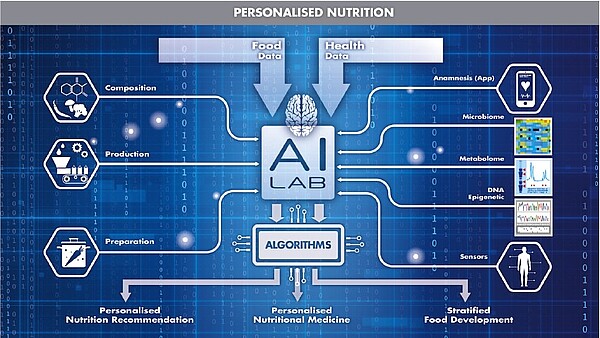SENSE
Systemic nutritional medicine
The aim of personalized nutrition is to integrate food and health data to better understand the individual effect of foods/meals on the individual organism. This is a prerequisite for the development of prediction algorithms, on the basis of which a) intelligent food choices can be made to prevent disease, b) food can be produced in a tailored manner, and c) nutritional therapy can be controlled more precisely in a medical context.
Advances in biomedical research have enabled precision medicine approaches to a wide variety of different disease entities. Nutritional medicine has not yet benefited sufficiently from this development, despite the high relevance of nutrition as a pathophysiological factor in diseases of civilization. The proposed project SENSE aims to demonstrate that by integrating a) innovative biomedical analysis methods with b) continuously recorded body function data and c) taking into account the respective nutritional composition, it is possible to predict the individual body reaction to defined foods and meals. Furthermore, within the framework of a clinical application observation, it is to be demonstrated in an exemplary manner that personalized nutritional recommendations can be implemented and tolerated by patients. SENSE is not only a demonstrator, but serves as a nucleus for the formation of a platform for systemic nutritional medicine, which is to link the fields of medicine, IT and nutrition better than before. This is the basis for comprehensive data collection and AI applications, through which personalized nutritional recommendations will be made possible and the identification of individually health-promoting nutritional substances/nutraceuticals will be advanced. In the long term, SENSE should help to prevent diseases through individually optimized nutrition or at least modulate them at very early stages of disease in such a way that a clinical outbreak or secondary diseases are prevented.
The pilot project "SENSE" aims to answer the following main questions:
- Can the body reactions that can be measured during food intake be attributed to individual foods - and can individual patterns be identified?
- Do the body function data recorded by fitness trackers/wearables correlate with metabolic parameters and can stratified nutrition recommendations be derived from them?
- Are AI-based nutritional recommendations accepted by patients in the context of clinical nutrition therapy and can this increase the usually low overall therapy adherence of patients?
Research groups and institutions involved in the SENSE project are the Digital Biomarkers and Clinical Studies Group of the Institute of Nutritional Medicine, the section of Nutritional Medicine at Medical Clinic 1, the university Startup-company Perfood GmbH, the Institute of Medical Informatics and the Institute of Chemistry and Metabolomics (ICM) with the joint NMR- Metabolomics Unit.
The research of Prof. Christian Sina and his team is based on the assumption that disease-relevant target cells with specific metabolic requirements (so-called auxotrophy) can be influenced in a targeted manner by dietary interventions. Research into appropriate nutritional therapeutic approaches encompasses basic research as well as work on personalized nutrition and clinical biomarkers. In this context, the Institute Nutritional Medicine together with the Institute of Chemistry and Metabolomics, UzL operates a recently implemented and competitively acquired NMR metabolomics platform, which is an important tool for systemic nutritional medicine. Work on personalized nutrition is carried out in collaboration with Perfood GmbH, a startup company spun out of the Institute of Nutritional Medicine in 2017 that recently completed Series-A funding. Perfood GmbH has recorded the individual blood glucose reactions of more than 3,000 subjects (more than 2 million documented meals) and uses these findings to develop digital therapy products for obesity, type 2 diabetes mellitus, migraine, and acne, among others.
The working group "Medical Data Science" (Head: Prof. Dr.-Ing. Marcin Grzegorzek) at the Institute for Medical Informatics at the University of Lübeck is the second unit besides the Institute for Nutritional Medicine which is implemented within the framework of SENSE. Part of the working group is the so-called AppsLab (Assessment of Physical and Psychological Signals), which is equipped with numerous sensor systems (SensFloor, wearables, cameras) to collect behavioral and physiological sensor data from people. Prof. Marcin Grzegorzek and his team develop and research learning-based artificial intelligence algorithms for the health-related evaluation of human data.
Project Manager
Marcin Grzegorzek, Prof. Dr.-Ing.

Institut für Medizinische Informatik (IMI)
+49 451 3101 5603
marcin.grzegorzek(at)uni-luebeck.de



![[Translate to english:] Link COPICOH [Translate to english:] Link COPICOH](/fileadmin/_processed_/9/1/csm_LI-In-Bug_8ed46db0dc.png)
![[Translate to english:] Link COPICOH [Translate to english:] Link COPICOH](/fileadmin/_processed_/1/b/csm_vimeo_icon_white_on_blue_rounded_b79e632cf7.png)